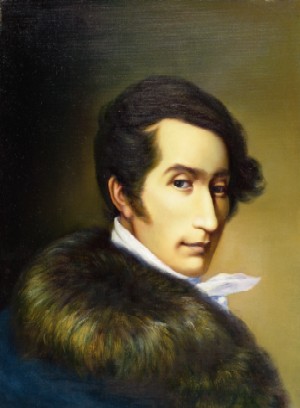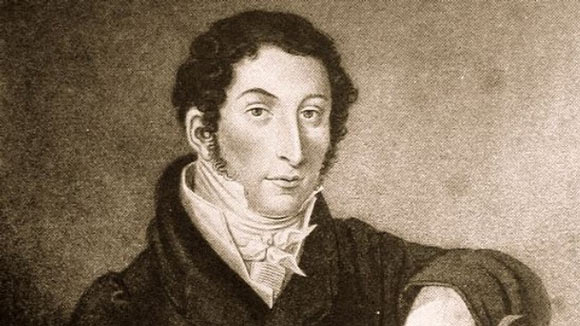Carl Maria von Weber: A Complete Biography
Introduction
Carl Maria von Weber (1786–1826) was a pivotal figure in the development of German Romantic opera and a multifaceted composer whose influence extended well beyond his own time. Known most famously for Der Freischütz, Weber was not only a composer but also a conductor, pianist, and critic. His work helped to shape a distinctly German operatic tradition and influenced future generations of composers, including Richard Wagner, Franz Liszt, and even Frédéric Chopin.

Childhood
Carl Maria Friedrich Ernst von Weber was born on November 18, 1786, in Eutin, a small town in the Holstein region of Germany. His father, Franz Anton von Weber, was a restless and ambitious man who had theatrical aspirations and managed a traveling company of musicians and actors. This unstable lifestyle meant that Carl’s early years were spent moving from town to town across the German-speaking world. Despite the instability, Franz Anton was determined that his son would become a musical prodigy, akin to Mozart, to whom the family was distantly related.
Carl’s first exposure to music came from within the family. He took early lessons from Johann Peter Heuschkel and later from Michael Haydn, Joseph Haydn’s younger brother. Although Carl suffered from congenital hip dysplasia, which gave him a limp throughout his life, he demonstrated musical talent at a very young age. By the time he was ten, he had already composed several small works, and his first opera, Die Macht der Liebe und des Weins, was written when he was just 13.
Youth
Weber’s adolescence was marked by both intense study and personal difficulty. He studied under the influential teacher Abbé Vogler, whose mentorship would prove essential. Vogler emphasized innovation and encouraged Weber to explore orchestration, harmony, and structural daring. It was during this period that Weber met and formed a close friendship with fellow student Giacomo Meyerbeer, who would later become one of the most important composers of French Grand Opera.
Throughout his teenage years, Weber held several short-term appointments, including music director roles in Breslau and Stuttgart. His time in Stuttgart was particularly difficult due to personal scandals, including accusations of embezzlement, which led to his dismissal and brief imprisonment. However, these turbulent years also helped form his resolve and gave him valuable administrative and compositional experience.
Adulthood
In 1813, Weber’s fortunes began to improve significantly when he was appointed director of the Prague Opera. There, he introduced reforms to improve the quality of performances and programming. His success in Prague led to an even more important post in 1817 as the director of the newly founded German Opera in Dresden. Here, he championed the cause of German-language opera, which had long been overshadowed by Italian works.
Weber’s adult years were remarkably productive. He wrote numerous orchestral, chamber, and vocal works. As a conductor, he was among the first to use a baton, helping to formalize and professionalize the role of conductor in a modern sense. He also continued to write as a critic and essayist, articulating his vision for a truly national form of opera rooted in German folklore and tradition.
In 1817, Weber married Caroline Brandt, a soprano he had met in Prague. Their marriage was a happy one, and she often performed in his operas.
Major Compositions
Weber’s most enduring contribution to music is undoubtedly his opera Der Freischütz (1821), often considered the first great German Romantic opera. The work, based on a German folk tale, blends supernatural elements, emotional depth, and national identity with innovative orchestration. The famous “Wolf’s Glen Scene” is particularly noted for its eerie atmosphere and dramatic intensity.
Other important operas include Euryanthe (1823) and Oberon (1826). Although Euryanthe was less successful than Der Freischütz, it contains some of Weber’s most advanced harmonic writing and would later influence Wagner. Oberon, his final opera, was commissioned in London and written in English. Despite being ill during much of its composition, Weber delivered a brilliant work that showcased his melodic gifts and orchestral color.
In addition to opera, Weber composed instrumental works, including two clarinet concertos and the Concertino for Clarinet, which expanded the instrument’s role in the concert repertoire. His Piano Sonatas, Invitation to the Dance, and various overtures also show his gift for melody and orchestral imagination.
Death
Weber’s health deteriorated steadily throughout the 1820s due to tuberculosis. Despite his worsening condition, he accepted a commission to write Oberon for the Royal Opera House in London. The premiere in April 1826 was a success, but the journey and stress proved too much for his fragile health.
On June 5, 1826, Carl Maria von Weber died in London at the age of 39. He was buried there, though his remains were transferred to Dresden in 1844, where Richard Wagner gave a eulogy honoring him as the spiritual father of German Romantic opera.
Conclusion
Carl Maria von Weber was a trailblazer whose work bridged the Classical and Romantic eras. He helped to establish a uniquely German voice in opera, one that celebrated folklore, nature, and emotional depth. Although his life was short, his legacy endured through the music of later composers, especially Richard Wagner, who admired Weber deeply.
More than just a composer, Weber was a reformer, conductor, and visionary. His commitment to musical excellence, national culture, and dramatic integrity continues to resonate in the concert halls and opera houses of the world.

Comments are closed